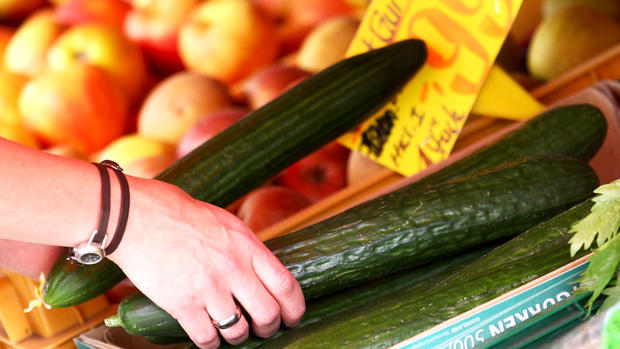If bean sprouts didn't cause deadly E. coli outbreak, what did?
(CBS/AP) If bean sprouts aren't the source of the E. coli outbreak that has killed 22 people and sickened thousands in Europe, what is? Officials in Germany, the hardest hit nation, still don't know - and a World Health Organization expert says time is running out.
PICTURES - E. coli: 5 life-saving facts you must know
"If we don't know the likely culprit in a week's time, we may never know," Dr. Guenael Rodier, director of communicable diseases expert at WHO, said on Tuesday. He said the contaminated vegetables have likely disappeared from the market, and it would be hard to link patients to tainted produce weeks after they first became infected.
Other experts issued harsher criticism of the German investigation.
"If you gave us 200 cases and 5 days, we should be able to solve this outbreak," said Michael Osterholm, director of the Center for Infectious Disease Research and Policy at the University of Minnesota, whose team has contained numerous food-borne outbreaks in the U.S.
Osterholm called the German effort as "erratic" and "a disaster" and said officials should have done more detailed patient interviews as soon as the epidemic began. In the last week, German officials wrongly accused Spanish cucumbers and then German sprouts of sparking the crisis, which began on May 2.
Osterholm said the Germans should have been able to trace cases of illness to infected produce by now and that tests on current produce won't be helpful. "It's like looking at camera footage of a traffic intersection today to see what caused an accident three weeks ago," he said. "This is an outbreak response that is not being led by the data. Solving an outbreak like this is difficult, but it's not an impossible task."
In outbreaks, it is not unusual for certain foods to be suspected at first, then ruled out. In 2008 in the U.S., raw tomatoes were initially implicated in a nationwide salmonella outbreak. Consumers shunned tomatoes, costing the tomato industry millions. Weeks later, jalapeno peppers grown in Mexico were determined to be the cause.
In the current E. coli outbreak, tests are continuing on sprouts from an organic farm in northern Germany, but have so far come back negative. But Rodier said that doesn't necessarily exonerate the vegetables.
"Just because tests are negative doesn't mean you can rule them out," he said. "The bacteria could have been in just one batch of contaminated food and by the time you collect specimens from the samples that are left, it could be gone."
He said food-borne outbreaks are hard to contain because they involve multiple industries, government departments and in Germany's case, several layers of bureaucracy to report numbers. That results in a slight reporting delay, which makes it harder for experts to know whether an outbreak is peaking or not.
The outbreak has killed 21 in Germany and one in Sweden.
Germany's national disease control center, the Robert Koch Institute, on Tuesday raised the number of infections in Germany to 2,325, with another 100 cases in 10 other European countries and the U.S. The number of victims hospitalized in intensive care with a rare, serious complication that may lead to kidney failure rose by 12 to 642.
The institute said the number of new cases is declining - a sign the epidemic might have reached its peak - but added it was uncertain whether that decline will continue.
In a major difference from other E. coli outbreaks, women - who tend to eat more fresh produce - are by far the most affected this time. Most of the victims in Germany are 20 to 50 years old and tend to be highly educated, very fit, and lead healthy lifestyles, investigators said.
Or as Friedrich Hagenmueller of the Asklepios Hospital in Hamburg, Germany, put it, "What do they have in common? They are thin, clean pictures of health."
The American Academy of Family Physicians has more on E. coli infections.

